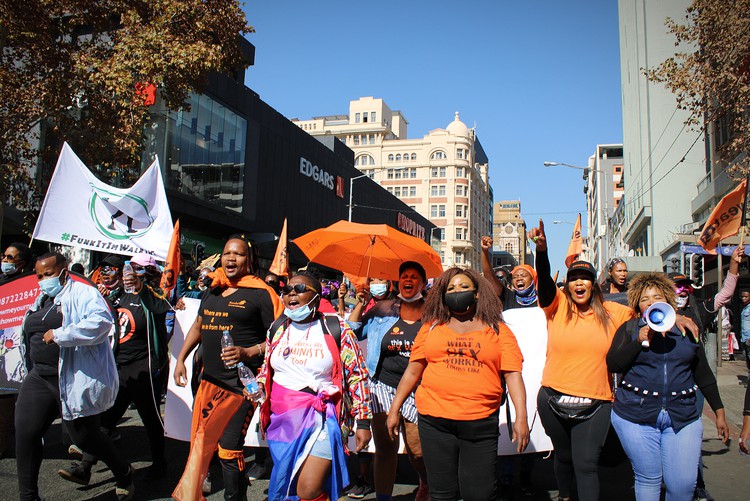
27 August 2021
Sex workers and supporters marching in the Johannesburg CBD in May 2021, calling for the decriminalisation of sex work and safe spaces for women in the city. Archive photo: Masego Mafata
A national survey has found that women sex workers in South Africa are exposed to extremely high levels of violence. In the year previous to the study, 71% of female sex workers said they had been exposed to physical violence and 58% said they had been raped. One in seven of the women reported being raped by a policeman.
The study also found that sex workers were extremely vulnerable to rape by clients, men they encountered in the community, as well as their intimate partners.
The study was published in the journal SSM-Mental Health. It was done by the South African Medical Research Council (SAMRC) and the Perinatal HIV Research Unit at the Chris Hani Baragwanath Hospital.
Over 3,000 adult sex workers in all nine provinces participated. Nearly 60% were between 18 and 35 years old. 17% had migrated to South Africa from other countries. 65% reported being undocumented.
More than half suffer from depression and nearly half struggled to get enough food. About 9 in 10 said that they had experienced abuse or trauma as children.
The researchers wrote about the “abuse of power by the police”. They pointed out that their research had similar findings to a previous study conducted in Cape Town that found that 12% of sex workers had been raped by police and 28% had been asked for sex by officers when in custody after arrest. In this new study, they wrote, “Street-based sex workers in Cape Town were specifically found to be vulnerable to misuse of power by law enforcement authorities.”
“Physical violence, rape and verbal abuse or threats of abuse from police, and fear of arrest were found to prevent sex workers from reporting violence to the police or accessing other public agencies (such as health or social services), exacerbating their trauma and health risks.
“It is unlikely that sex workers will report such cases of abuse and violence against them. The very high prevalence of police violence … reported in some districts suggests that the problem in those areas is systemic and unlikely due to isolated bad actors.”
Professor Rachel Jewkes, Executive Scientist for Research Strategy in the Office of the SAMRC President, and co-author of the study, described the findings as clearly showing that women sex workers experience levels of violence that are even higher than the very high levels found in informal settlements.
The study says that “decriminalisation of sex work is foundational for measures to substantially advance the safety” of sex workers.
The researchers wrote many of the problems they highlight can be improved by, for example, improving women’s economic circumstances, interventions to change the behaviour of police, and mental health and substance use interventions.
The Sex Workers Education and Advocacy Taskforce (SWEAT) found the statistics shocking, but unsurprising.
According to SWEAT, sex workers are routinely harassed through the misuse of laws, public by-laws (such as “loitering” and “public nuisance”) and other regulations.
SWEAT spokesperson Megan Lessing said the study confirms that violence and abuse of sex workers by police is pervasive and entrenched.
SWEAT is advocating for the decriminalisation of sex work. This would mean that the buying and selling of sex becomes legal and employment of sex workers is also legal. Sex work is controlled by general labour laws and this would mean that sex workers can organise legally, such as forming a union. It also means that employers (such as brothel managers) must obey health and safety labour laws.
With decriminalisation, sex workers would feel better able to report violence to the police and even report corrupt police officers, with less fear of arrest or abuse. Sex workers can also work more openly, in well-lit public streets, in legal brothels or in their own homes. This, along with reduced stigma and discrimination, would make them less likely to be attacked.
According to SWEAT, a sex worker is many more times likely to be murdered than any other woman. Decriminalisation would improve sex workers’ ability to access their rights and get protection and recourse against police harassment and violence.